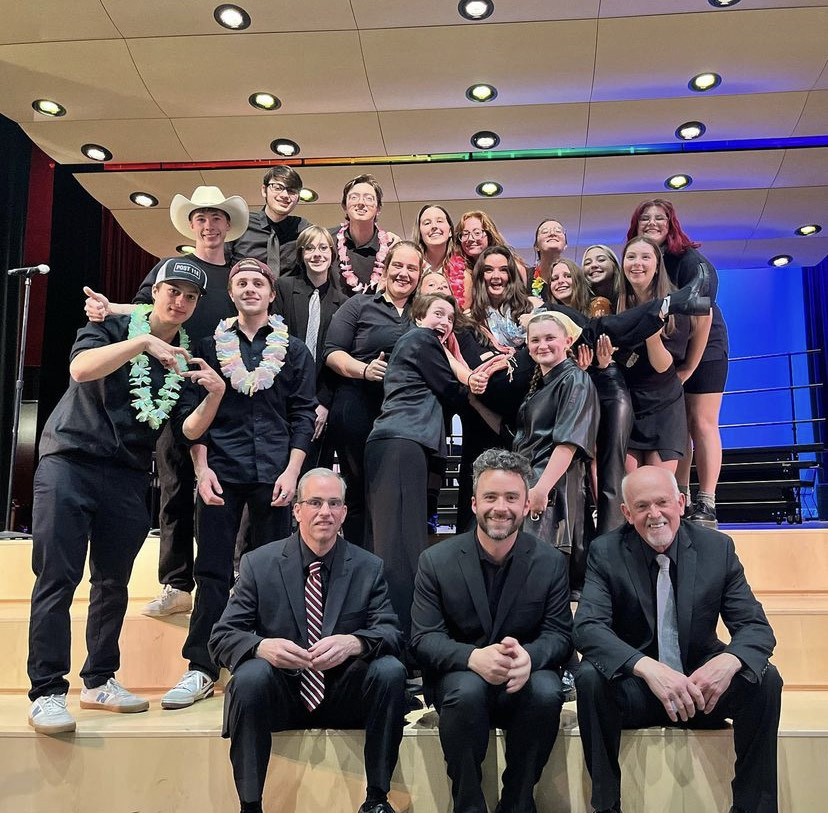Why Should You Continue Music In High School?
Band and chorus seniors pose for a photo with their music teachers following their final performance of the year
June 2, 2023
Starting in fourth grade, Scituate students are introduced to the world of music using their voices and acquainting themselves with shiny instruments. Unfortunately, this excitement can fade after several years as some students begin to see music class as more of a chore than a fun activity. In addition, stereotypes associated with high school bands can be off-putting. SHS sophomore Brendan McCarthy, who started playing trumpet at Cushing Elementary School, feels a stigma surrounds participation in music: “There’s a strong negative connotation around being a band kid, and it drives people away from a really cool opportunity,” he said.
Those students who continue their musical journey at SHS discover many benefits from the high school program. In addition to McCarthy, I interviewed a group of sophomore band students to understand their perspective: Aisling O’Leary, Drew Webster, Noah Shepard, and Nicolai Bokavich have been playing in school bands since 4th grade with instruments ranging from the rare oboe to the well-known trumpet.
Sharing his thoughts on the current music program, Shepard said, “The music department currently has a lot of different opportunities for different students. There are symphonic band and chorus, and elective courses that allow students to excel at other instruments like guitar and piano.” Bokavich would like to see the high school band interact more with the middle school band: “I wish high school students could mentor the younger kids more,” he noted.
Symphonic band students are challenged with pieces of music they don’t usually interact with. Still, there are also opportunities to play tunes most people would know. Webster commented, “My favorite part of being in music is playing songs you know from movies and getting to play them because everyone knows them.”
The band community creates strong connections between all grade levels. Participating in the school band helps students feel accepted and welcomed. O’Leary said, “The music community is more welcoming than any other community in the school. I’ve made so many friends through music.”
Sophomore Quinn Corkins has been taking the elective Advanced Guitar Workshop this semester and has been collaborating with peers by performing at the Stoop. According to Corkins, the music program “allows you to collaborate with other people to make it sound better than when you play it alone.” Corkins enjoys being part of the music community and says, “It looks very fun to be in band, but there is a very high skill requirement along with it being a large dedication of your time. It’s really limiting in your elective-choosing abilities.” Corkins expressed additional concerns about the SHS music program: “It’s not diverse enough and centers around the symphonic band.”
Since elementary school, SHS freshman Emory Matthews has been playing saxophone but plans to leave the music program next year. He decided to leave because he “felt bored.” Sometimes he enjoyed it but felt he didn’t connect with the music enough. Matthews is not planning on taking other music electives but taking AP Human Geography and 2D Art.
As a student who has stayed in the music program since fourth grade, I can also admit I went through a long patch when I wanted to quit. All of my friends in middle school had quit, and all I wanted to do was leave with them. My parents insisted I stay because it was an important activity that challenged my brain. By the end of middle school, I was the only flute player left in my grade.
I’m now a high school sophomore and wouldn’t be the same person without the SHS band. My friend group is immersed in the music program, allowing us to have shared interests and activities. I’ve also met several upperclassmen who have influenced me and given me advice on music and high school. Whenever I need somewhere to go, the band room is a place that welcomes everyone.
